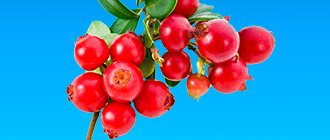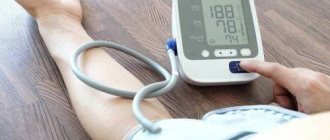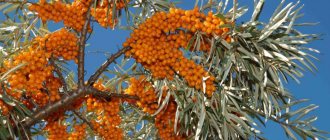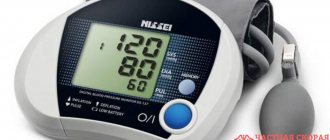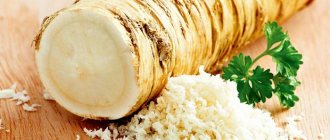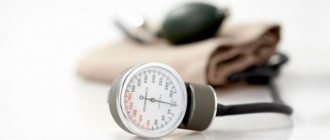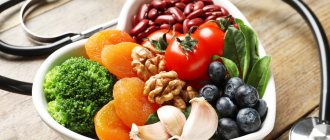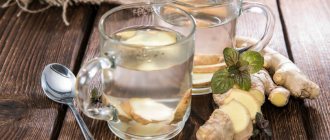People suffering from hypertension are looking for a variety of ways to cope with their illness.
Experienced patients not only take medications, but also try to consume healthy foods that have a beneficial effect on the cardiovascular system and have a hypotensive effect.
From many hypertensive patients you can hear a lot of positive feedback about blood pressure and bananas. This delicious fruit is believed to have therapeutic properties and help lower blood pressure.
Composition and beneficial properties
Sweet and ripe bananas are one of the most favorite fruits for most adults and children.
In addition to their pleasant taste, these bright yellow fruits have many beneficial properties. But what’s interesting is that bananas increase or decrease blood pressure? They contain a large number of substances valuable for the body.
Fruits are rich in plant fiber, vitamins A, B, C, E, PP, phosphorus, iron, calcium, zinc, sodium, magnesium, manganese, etc. And potassium lowers blood pressure.
In addition, bananas contain a lot of potassium (376 milligrams in 100 grams of banana pulp, or about 500 milligrams in one medium-sized fruit). Studies have shown that just two fruits eaten can meet a person's daily potassium requirement.
When consumed regularly, the substances contained in bananas have the following effects on the body:
- strengthen the heart muscle;
- normalize heart rhythms;
- make the walls of blood vessels stronger and more elastic;
- help lower blood pressure;
- accelerate blood circulation;
- reduce the risk of varicose veins;
- reduce swelling;
- remove toxins;
- accelerate metabolism;
- prevent the development of atherosclerosis, various diseases of the heart and blood vessels;
- reduce the amount of cholesterol in the body;
- increase the level of hemoglobin in the blood;
- improve food digestibility;
- stimulate the functioning of the kidneys, liver and gastrointestinal tract;
- help cope with attacks of heartburn and nausea;
- improve the condition of the gastric mucosa in case of ulcers and gastritis;
- eliminate muscle pain;
- strengthen bone tissue;
- prevent the development of arthritis and osteoporosis;
- boost immunity;
- reduce excessive sweating;
- improve memory;
- stabilize brain function;
- prevent dehydration of the body;
- stimulate the production of serotonin and thereby improve mood;
- help fight nervous disorders, irritability, and causeless anxiety;
- increase stress resistance;
- relieve fatigue;
- have a positive effect on human performance;
- allow you to recover faster after intense physical and mental stress;
- eliminate sleep disorders.
Very often, doctors advise patients who have recently undergone surgery, chemotherapy, or radiation treatment to eat bananas.
This fruit will also be useful for athletes who regularly perform heavy physical exercise.
Bananas and banana puree can be eaten even by children under one year of age when complementary feeding is introduced; the tasty fruits, unlike many other fruits, are hypoallergenic and do not provoke the appearance of rashes, irritations, redness and other allergic reactions on the sensitive skin of infants.
100 grams of banana pulp contain 90 kilocalories; the tasty fruit perfectly satisfies hunger, gives a feeling of fullness for a long time and quickly replenishes the body’s energy supply.
Do bananas lower or increase blood pressure for hypertension?
Many people have the incorrect belief that bananas grow on palm trees.
In fact, the yellow fruits are classified as a perennial herb. The tropics of Southeast Asia are considered the birthplace of bananas. Due to their rich composition, they are used in folk medicine. The oblong fruits are also recommended for use for diseases of the cardiovascular system. Therefore, hypertensive patients will be interested to know how bananas affect blood pressure. But before that, let’s find out their benefits and harms. Content:
Benefits and harms Bananas and blood pressure Recipes for hypertension
The benefits of bananas are primarily characterized by the fact that they are rich in vitamins A, C, E, B, PP. The exotic fruit in its pulp contains large quantities of fiber, sucrose, carotene enzymes, organic acids, biologically active substances, macro- and microelements (potassium, magnesium, sodium, calcium, manganese, zinc). Thanks to this composition, the product has bactericidal, anticonvulsant, sedative and multivitamin effects.
The medicinal properties of bananas remove toxins from the body, improve metabolic processes, promote better absorption of food, strengthen bone tissue, boost the immune system, reduce sweating, and eliminate muscle pain. The exotic fruit prevents the development of osteoporosis, arthritis, diseases of the gastrointestinal tract, liver and kidneys. Numerous studies have shown that bananas can improve the condition of the gastric mucosa if a person is faced with an ulcer or gastritis. The product improves brain function and memory, protects against dehydration, increases stress resistance and mood, stimulating the production of serotonin. It is also worth noting that bananas increase performance because they relieve fatigue. They also eliminate sleep disorders and restore the body after mental and physical stress. The product makes a significant contribution to the prevention and treatment of diseases of the cardiovascular system, but we will touch on the topic of “bananas and blood pressure” a little later.
The benefits and harms of bananas vary from person to person. You should not eat this fruit if you have high stomach acidity, hypotension (low blood pressure), flatulence, or thrombophlebitis. Since yellow fruits increase blood glucose levels, they should not be eaten by people with diabetes. If a person is obese, then there is no need to abuse sweet fruits. It is enough to eat no more than 4 pieces per day. It is not recommended to eat them on an empty stomach and wash them down with water, which will avoid possible stomach upset. Preference should be given to golden or bright yellow fruits without dark spots, dots, or mold. It is best to store bananas at a temperature of +12 degrees, without separating them from each other, since in such conditions they retain their taste and beneficial properties longer.
Can you eat bananas if you have hypertension? Will it cause harm to the heart and blood vessels? These questions can be heard most often from the lips of hypertensive patients. In fact, this product is not only needed, but must be used for arterial hypertension and other diseases of the cardiovascular system. Regular consumption of bananas normalizes heart rate, improves blood circulation, strengthens the heart muscle, and removes accumulated fluid from the body, which helps reduce swelling.
The product lowers blood cholesterol levels, increases hemoglobin levels, prevents the development of atherosclerosis, and reduces the risks of stroke, heart attack, and varicose veins. Since bananas lower blood pressure, they prevent the development of hypertension. All this is explained by the high content of potassium, calcium, magnesium, and folic acid. As a result, the product has a beneficial effect on the functioning of blood vessels and the heart, normalizes water balance, and improves oxygen supply to the brain and other organs.
We have already found out why bananas are natural saviors against hypertension. Now let’s figure out how much fruit you should eat to protect yourself from high blood pressure. They are recommended to be consumed fresh and added to milkshakes, yoghurts, cereals, and desserts. To significantly reduce the risk of cardiovascular diseases, scientists recommend eating 2-3 bananas per day.
The right choice of diet, as Western researchers note, helps control blood pressure. For example, experts were pleasantly surprised by the data of a US resident who, thanks to bananas, was able to reduce blood pressure from 150/100 to 130/85 within a few weeks. At the same time, he lost 5 kilograms in a month. Every day the man ate 2 bananas. He included foods low in cholesterol, saturated fat and total fat in his diet, and began to eat more fruits and vegetables. The man noted that thanks to the new menu, he stopped abusing food. Bananas helped him a lot, thanks to which he began to experience hunger less often, since the yellow fruits are high in calories and nutritious.
As you can see, an affordable natural medicine for blood pressure can deliver a strong blow in the fight against vascular and heart diseases, as well as significantly reduce the risks of their development. However, it is important to use the product in moderation. It is also necessary to take into account that the treatment of hypertension and other ailments should be approached in a comprehensive manner, which will significantly improve the therapeutic effect.
How do bananas affect blood pressure?
Scientists have long proven that bananas reduce blood pressure.
In order to prevent the development of hypertensive syndrome, a person needs to receive a sufficient amount of potassium with food.
This substance, beneficial for the body, is found in abundance in ripe banana pulp. In addition to the fact that bananas lower blood pressure, they have a beneficial effect on the functioning of the heart, supply the brain with oxygen, and normalize the water balance in the body.
That is why doctors recommend their patients to consume them ripe every day. You can eat fruits fresh; you can also add delicious fruits to smoothies, milkshakes, cereals, yogurts, various desserts and other dishes.
It has been proven that if you eat two to three bananas a day, you can significantly reduce the risk of strokes and heart attacks.
Contraindications
Bananas bring great benefits to the human body. Despite this, some people have to limit their consumption of these delicious fruits. There is an opinion that banana increases blood pressure - this is a big misconception.
Those who suffer from low blood pressure, flatulence, and high stomach acidity will have to minimize the amount or completely abandon bananas.
Also, people with diabetes should not eat sweet fruits, because Bananas contain a large amount of sugar and contribute to a rapid increase in blood glucose levels.
Eating too many bananas daily (more than five or six bananas a day) contributes to weight gain. People who have increased body weight or are suffering from obesity need to follow moderation and not overuse delicious fruits.
To avoid possible stomach upset, it is necessary to eat only fully ripe bananas; in addition, nutritionists do not recommend eating such fruits on an empty stomach and do not recommend washing them down with water.
Selection and storage
In order for bananas to give the expected therapeutic effect on blood pressure, they must be selected and stored correctly:
- when buying them in a store, it is best to give preference to bright yellow or golden fruits without dark spots, spots, or mold;
- those who are not going to eat fruits right away, but plan to store them at home for some time, need to choose slightly greenish fruits (such fruits will ripen to normal in a few days);
- if an unpeeled banana has too pronounced ribs, it means that it is not fully ripe (the skin of ripe fruit is smoother and more even);
- they must be stored in a dark and fairly cool place, but it is not recommended to put the fruits in the refrigerator;
- if a person has the opportunity, he can hang bananas on a rope in a well-ventilated room with a temperature of +12...+15 degrees;
- You should not separate purchased bananas from each other, because... The fruits are best preserved in bunches.
With normal storage, fruits will not lose their beneficial properties and pleasant taste.
Other fruits and foods for hypertension
Besides bananas, there are many other foods that help lower blood pressure.
With hypertensive syndrome, patients can use:
- spinach;
- lentils;
- nuts (walnuts, almonds, etc.);
- Dill seeds;
- milk;
- garlic;
- beans;
- baked potatoes;
- turmeric;
- ginger;
- olive oil;
- chilli;
- green tea and hibiscus tea;
- bitter chocolate;
- fish fat;
- low-fat fish;
- white poultry meat;
- cereals;
- coconut milk.
Any of the above products can be eaten only in the absence of allergic reactions. In addition, a hypertensive patient should not overeat or constantly eat only one product.
The diet of people suffering from high blood pressure should be complete, correct and varied (the attending physician should help the patient with choosing a diet and drawing up a daily menu).
Products that reduce blood pressure
For foods to fight hypertension, they must contain potassium, magnesium, fiber and should not contain sodium.
Greens lower blood pressure
Potassium helps the kidneys get rid of more sodium through urine. This, in turn, lowers blood pressure. Foods high in potassium include:
- romaine lettuce
- arugula
- kale
- turnip
- greenery
- spinach
- beet greens
Greens should be eaten raw and stored frozen. Don't eat canned greens; salt is often added to them. To make it tastier, you can mix greens with a banana, try it, you will be pleasantly surprised by the new taste.
Berries that lower blood pressure
Berries, especially blueberries, are rich in flavonoids. Research shows that consuming flavonoids can prevent hypertension and help lower blood pressure. In addition to blueberries, these beneficial compounds are found in raspberries and strawberries.
How beets reduce blood pressure
Beets contain nitric oxide, which dilates blood vessels and lowers blood pressure. The beneficial substances contained in beet juice help maintain normal blood pressure throughout the day.
How to eat beets? You can juice or simply grate and eat the beets raw. You can fry or stew it, or bake it.
Skim milk and yogurt
Skim milk is an excellent low-fat source of calcium. Low-fat dairy products are important parts of a diet to lower blood pressure. If you don't like milk, choose yogurt, but be careful about the sugar content in this product. Give preference to unsweetened yogurt.
Oatmeal
Oatmeal makes our list because it's high in fiber, low in sodium, and low in fat. Oatmeal for breakfast is a great way to fill up and is an excellent prevention of hypertension.
Bananas
Products that lower blood pressure must contain potassium. This includes banana. By cutting a banana into your oatmeal, you not only add an interesting taste to your morning dish, but above all, take care of your health.
Salmon
Salmon is an excellent source of omega-3 fatty acids, which not only lower blood pressure, but also prevent inflammation in the body. In addition, salmon contains vitamin D. Just bake the fish for dinner. it's fast, tasty and healthy.
Pumpkin and sunflower seeds
A favorite of many, the seeds contain potassium, magnesium and other minerals that can lower blood pressure. The main rule is to eat the seeds unsalted.
Garlic and spices
Garlic has the same effect on the body as beets. It also contains nitric oxide, which helps lower blood pressure. In general, aromatic spices can help you reduce your salt intake, which will also help keep your blood pressure normal. Include thyme, rosemary, basil, and cinnamon in your diet.
Dark chocolate
Dark chocolate contains more than 60% cocoa and has less sugar than regular chocolate.
Useful video
About the treatment of hypertension with folk remedies:
A tasty and sweet banana is not only an excellent product for a quick snack, but also a real healing agent that will help prevent the development of many serious diseases. Of course, for hypertension, bananas will not replace medications, but will enhance and complement the effect of prescribed medications. The most important thing when consuming this fruit is to observe moderation and not to overeat, otherwise a person may gain excess weight, which will negatively affect the condition of his heart and blood vessels.
Immunity® - innovation in the treatment of human hypertension
- Eliminates the causes of pressure disorders
- Normalizes blood pressure within 10 minutes after administration
To learn more…
What is hypertension?
Hypertension, or high blood pressure, is the pressure of blood on the walls of blood vessels. Over time, high blood pressure can damage blood vessels and cause heart disease, kidney disease, stroke and other problems. Hypertension is often called the silent killer because many patients do not experience any symptoms and high blood pressure wreaks havoc on the body over many years. Therefore, preventive measures must be taken by all people, and not just those who know about their disease.
Our therapists at Diamed clinics have extensive experience in treating patients diagnosed with hypertension. Make an appointment with a therapist by calling 8 or using the online appointment form located immediately below the article. After a course of treatment for hypertension, your doctor will prescribe preventative measures to maintain your results, including through proper nutrition.
Many risk factors for hypertension in humans cannot be controlled. These include, for example, your age, gender, heredity. But there are factors that you can control, such as diet. Today we will talk about what products exist that reduce blood pressure.
